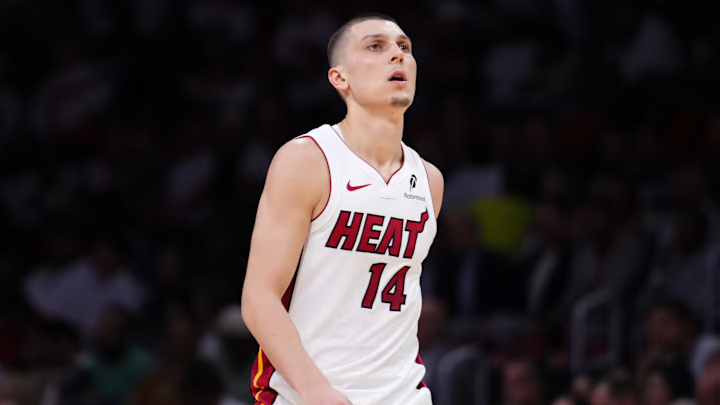Starting on October 1, Tyler Herro will become eligible to sign a three-year extension worth nearly $150 million. Don't bother setting your calendar notification, though, because an instant agreement on a new contract with the Miami Heat would be shocking to see.
This situation is complicated. Giving Herro the bag now might close the door on Miami's more ambitious long-term goals. Then again, delaying a new deal could prove costly if the dynamic guard, who booked his first All-Star trip this past season, takes another step forward and skyrockets his price rate. A trade seems feasible, too, although it's fair to wonder what he'd fetch with the league growing increasingly disinterested in one-way scoring guards.
It's all clear as mud, right? And it'll be just as murky when these two parties can officially start talking in just under a month.
Miami's problem with Herro has no obvious solution.
There will be certain members of the fanbase who immediately wonder whether Herro is worth all of this headache. They might tell you how contenders aren't built around non-superstars, or point to the skepticism about his ability to be the best player on even a decent team.
Of course, that also glosses over the fact that he is, by far, the best offensive player they have. And since offense remains this club's most glaring weakness, it's hard to find the logic in subtracting the top performer on that end from the equation, especially when he won't turn 26 years old until after the calendar flips to 2026.
Speaking of his offense, it's a lot closer to great than good. This past season, he was one of only eight players to average at least 23 points, five assists, and three three-pointers, per StatHead Basketball. Stephen Curry, Jayson Tatum, and Luka Doncic were among the others. Herro also earned a 93rd percentile ranking in estimated offensive plus/minus, per Dunks & Threes. It was the same ranking Kevin Durant held.
Herro isn't a perfect player, obviously, but he is a high-end scorer, a lights-out shooter, and a perpetually improving playmaker. It's hard to imagine a scenario in which this offense would be in better shape without him.
And yet, this isn't as simple as just handing him a blank check and preparing a press conference. If he's at his best with the ball in his hands, but his best isn't good enough to make this attack even middle-of-the-pack, then how can the Heat build around him? His defense is disastrous, too, and there's probably a reason clubs keep turning away from this archetype.
What's the right way for Miami to handle this? Great question, and one I'm thankfully not tasked with solving, because it has me—and quite possibly this fanbase and front office—all the way stumped.
